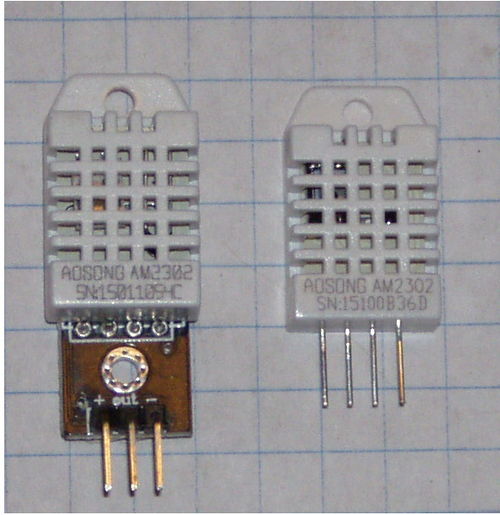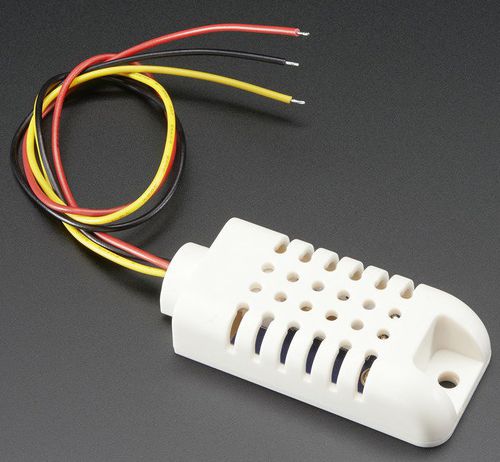Difference between revisions of "Sensors: DHT22"
(→Test Results) |
|||
| (11 intermediate revisions by the same user not shown) | |||
| Line 1: | Line 1: | ||
| + | [[File:Dht22 wiring1.jpg|thumb|right|500px|Left: DHT22 from Adafruit mounted on PCB with pull up and bypass capacitor.<br>Right: Bare sensor from EBay without pull up or bypass.]] | ||
| + | [[File:Wired dht22c.jpg|thumb|right|500px|Wired DHT22 '''WARNING''' DHT22 wire colors do not match telephone wire colors. Red: +5, Black: Ground, Yellow: Signal]] | ||
| + | |||
The AM2302 (DHT22) is a 3 wire (Vcc, data, gnd) temperature and humidity sensor manufactured by Aosong. | The AM2302 (DHT22) is a 3 wire (Vcc, data, gnd) temperature and humidity sensor manufactured by Aosong. | ||
| Line 6: | Line 9: | ||
==Test Results== | ==Test Results== | ||
| − | + | http://www.kandrsmith.org/RJS/Misc/hygrometers.html | |
| − | http://www.kandrsmith.org/RJS/Misc/ | ||
| − | |||
==Pull Up Resistor== | ==Pull Up Resistor== | ||
| − | + | The Adafruit module (left) includes a 5.1K pull up resistor and a bypass capacitor. | |
| − | The Pi does have internal pull ups that are turned on. | + | The Pi does have internal pull ups that are turned on. They are about 50K. Our tests on 3 meter cables did not show any significant difference in performance or read errors whether or not the 5.1K pull up or bypass capacitor was used. However, good engineering practices would use the pull up and bypass cap. |
| − | |||
| − | + | The new DHT22 spec sheet shows the pull up value as 1K in Figure 5. | |
| − | + | The old spec sheet said: "single bus usually require an external about 5.1kΩ pull-up resistor." | |
| − | + | ||
| − | + | ==Read Time== | |
| − | + | ||
| − | + | You must wait at least 2 seconds before reading again or you will get a bad read (the checksum will fail). | |
| − | |||
| − | The DHT22 spec sheet | ||
| − | |||
| − | |||
| − | |||
| − | The old spec sheet said: | ||
| − | "single bus usually require an external about 5.1kΩ pull-up resistor." | ||
| − | |||
| − | + | The new spec sheet: "the interval of whole process must beyond 2 seconds." | |
| − | + | The old spec sheet: | |
| − | |||
| − | |||
| − | |||
| − | The old spec sheet | ||
3.Read the sensor minimum time interval for the 2S; read interval is less than 2S, may cause the temperature and humidity are not allowed or communication is unsuccessful, etc.. | 3.Read the sensor minimum time interval for the 2S; read interval is less than 2S, may cause the temperature and humidity are not allowed or communication is unsuccessful, etc.. | ||
4.Temperature and humidity values are each read out the results of the last measurement For real-time data that need continuous read twice, we recommend repeatedly to read sensors, and each read sensor interval is greater than 2 seconds to obtain accurate data. | 4.Temperature and humidity values are each read out the results of the last measurement For real-time data that need continuous read twice, we recommend repeatedly to read sensors, and each read sensor interval is greater than 2 seconds to obtain accurate data. | ||
| − | + | ||
| − | + | WARNING: The spec sheet refers to this a a "1-wire" device. This is not a [https://en.wikipedia.org/wiki/1-Wire 1-Wire] bus trademarked by Dallas Semiconductor Corp. The later spec sheet has a disclaimer. | |
| − | |||
| − | |||
| − | |||
| − | |||
| − | |||
| − | |||
| − | |||
| − | |||
| − | |||
| − | |||
| − | |||
| − | |||
| − | |||
| − | |||
| − | |||
| − | |||
| − | |||
Latest revision as of 02:19, 27 August 2018
The AM2302 (DHT22) is a 3 wire (Vcc, data, gnd) temperature and humidity sensor manufactured by Aosong.
Spec Sheets
AM2302 spec sheet
New AM2302/DHT22 spec sheet
Test Results
http://www.kandrsmith.org/RJS/Misc/hygrometers.html
Pull Up Resistor
The Adafruit module (left) includes a 5.1K pull up resistor and a bypass capacitor.
The Pi does have internal pull ups that are turned on. They are about 50K. Our tests on 3 meter cables did not show any significant difference in performance or read errors whether or not the 5.1K pull up or bypass capacitor was used. However, good engineering practices would use the pull up and bypass cap.
The new DHT22 spec sheet shows the pull up value as 1K in Figure 5. The old spec sheet said: "single bus usually require an external about 5.1kΩ pull-up resistor."
Read Time
You must wait at least 2 seconds before reading again or you will get a bad read (the checksum will fail).
The new spec sheet: "the interval of whole process must beyond 2 seconds."
The old spec sheet:
3.Read the sensor minimum time interval for the 2S; read interval is less than 2S, may cause the temperature and humidity are not allowed or communication is unsuccessful, etc.. 4.Temperature and humidity values are each read out the results of the last measurement For real-time data that need continuous read twice, we recommend repeatedly to read sensors, and each read sensor interval is greater than 2 seconds to obtain accurate data.
WARNING: The spec sheet refers to this a a "1-wire" device. This is not a 1-Wire bus trademarked by Dallas Semiconductor Corp. The later spec sheet has a disclaimer.

